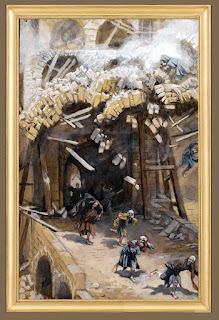Apr 11 Fri
Why was Mary at the foot of the Cross?
Within a week we shall see Jesus Christ embracing his Cross to redeem us, Our Lady is with Him. Today, we should immerse ourselves in Mary's Immaculate Heart, which suffered so much because of our sins.
From the words of Simeon, Mary learned that God had a role for her, next to her Son, in the work of redemption, which would demand suffering and sacrifice: “Behold, a sword will pierce your own soul also." Yet Our Lady placed herself unreservedly at the service of God's plan.
Now, “we realize that the supernatural value of our life does not depend on accomplishing the great undertakings suggested to us by our overactive imagination. Rather it is to be found in the faithful acceptance of God's will, and in welcoming generously the opportunities for small, daily sacrifice."
How often our Lady must have meditated on the mission she was called to carry out at Christ's side! ‘But Mary kept all these things, pondering them in her heart.’ “Let us try to imitate her, talking to our Lord, conversing like two people in love about everything that happens to us, even the most insignificant incidents."
That is the way Mary lived during the thirty years of Jesus' hidden life: thirty long years of simple, ordinary life, just like that of any other home in a small village in Galilee, but years filled with ever-increasing fervor as she carried out God's will. In these years Mary shows herself as the teacher of the sacrifice that is hidden and silent.
One day, when Jesus was about thirty, He said goodbye to his Mother and left the house of Nazareth. He was beginning his public life. From then on, until the moment of the Passion, our Lady practically disappears from the Gospel scenes: “See her, nearly always in the background, cooperating with her Son; she knows, yet keeps silence."
We must learn from our Mother how to sacrifice ourselves gladly, and without attracting attention, filled with supernatural hope. “What a contrast between our Lady's hope and our impatience! So often we call upon God to reward us at once for any little good we have done. No sooner does the first difficulty appear than we start to complain. Often, we are incapable of sustaining our efforts, of keeping our hope alive." Contemplating Mary's life will help us to rectify our outlook, and make it more supernatural.
On the Cross, Jesus wanted to have her at his side, and Mary assented. “What could she do? She united herself fully with the redemptive love of her Son, and offered to the Father her immense sorrow, which pierced her pure heart like a sharp-edged sword."
On the Cross, “Jesus looks at her, and then turning his gaze to John he exclaims, Woman, this is your son. Then he said to the disciple, This is your Mother. In the person of John, Christ is entrusting all to his Mother, and especially his disciples: those who were to believe in him."
“Mother, my Mother - yours, because you are hers on many counts - may your love bind me to your Son's Cross; may I not lack the faith, nor the courage, nor the daring, to carry out the will of our Jesus."





















